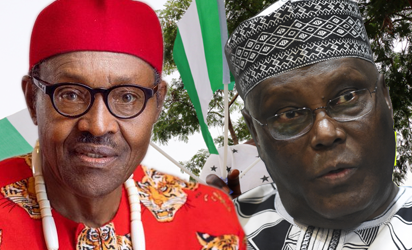News
2019 General Elections: Buhari Vs Atiku: Osuntokun, Keyamo In War Of Words

Olayemi Olayemi
With less than three months to the 2019 general elections, camps of the two front-line Presidential candidates – Muhammadu Buhari of the ruling All Progressives Congress, APC, and Atiku Abubakar of the Peoples Democratic Party, PDP have been advancing reasons Nigerians should rally behind their respective principals at the polls. This is not unexpected given the green light beamed on campaign activities by the Independent National Electoral Commission, INEC about a fortnight ago.
Atiku, a former Vice President has in the past three weeks been very active on the political space, utilising every opportunity to remind Nigerians on the need to reject the APC and bring to power a man familiar with the business of job creation. On his part, President Buhari is wasting no time to weave his own story, a lamentation of the failure of the PDP to make the most of the nation’s resources, particularly earnings from crude oil while it was in power for 16 years.
Earlier in the week, a spokesman of the PDP Presidential Campaign Organization, and former Director General of the News Agency of Nigeria, Akin Osuntokun squared up against his APC counterpart, Festus Keyamo in what was clearly a contest of ideas, oratory, history, and stewardship of their respective bosses. The two gave fairly good accounts of themselves at the Channels Television Breakfast programme, Sunrise Daily.
According to Osuntokun, President Buhari has prepared the grounds for his imminent defeat at the polls with a catalogue of self-inflicted woes ranging from his continued refusal to sign the Electoral Act (as amended) to the worsening security challenges ravaging some parts of the country. He accused President Buhari of distracting service chiefs with his re-election bid, adding that in saner climes, heads of the various security agencies ought not to get anywhere close to political gatherings, if only to prove that they have no political affiliations. He was not done yet as he again questioned the first citizen’s nationalistic disposition since taking over power in 2019.
“This is a President that discriminates in the affairs of the nation. The problem in this country today is political division and anarchy. Some time ago, President Buhari engaged Nigerians in Hausa language during a national broadcast. If Obasanjo had engaged Nigerians in Yoruba language; if Goodluck Jonathan had engaged Nigerians in Ijaw language; would we have been talking of one Nigerian today?” Osuntokun asked.
He called attention to what he called the nation’s worsening economy since President Buhari took over power in 2015, noting that since then, job losses have been recorded in millions; a development that in his words has further compounded the unemployment scourge in the land.
He concluded that the above and many other “missteps” of the Buhari-led administration are enough reasons for the electorate to settle for the former Vice President in the 2019 elections.
“Ask an average Nigerian if he is better off today than he was four years ago. Our candidate (Atiku) units. He brings people together and he has what it takes to heal a divided Nigeria today,” he added.
For Keyamo however, “PDP is running the most self-indicting campaign” he has ever seen in recent times. In his words, “The PDP is using the same problems they caused as campaign issues, adding that “the same people who caused these problems say they are out to get Nigeria working again.”
Throwing more light on his assertion, the Senior Advocate of Nigeria said it was while the PDP was in power that “a President went about visiting churches, kneeling down for pastors to intercede on his behalf (I am not saying there’s something wrong with that).” He then asked: “Have you seen Mr. President (Buhari) going from one mosque to the other to be blessed by Imams? So, who divided Nigeria the more along religious lines and what have you,”?
He countered Osuntokun’s claim that President Buhari’s refusal to sign the Electoral Act amendment portend danger to the polity, saying “It is his (Buhari’s) discretion to sign or not to sign. There is a law with which elections can be conducted today. PDP should not grandstand because it was the President who pointed the omission of card reader in the amendment they first brought to him to sign. As far as we are concerned, they are the more beneficiaries of the skewed system that they are complaining about now.”
Speaking exclusively to Saturday Vanguard on the chances of Atiku, Kola Ologbondiyan, Director, Media and Publicity of the PDP Presidential Campaign Council noted that unlike in 2015 when the then opposition “hoodwinked” voters into electing Buhari President; the tides, he said have changed; making the contest one in which the electorate will “take a look at the big picture before casting their votes.”
